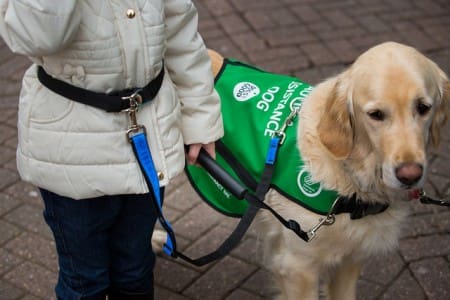Many autistic children and adults have a special bond with dogs. Through our experience of training dogs for autistic children we’ve seen the amazing difference dogs can make.

Research from the University of Lincoln found that autistic children experience fewer meltdowns in the presence of a pet dog and their parents stress levels are significantly lowered, but we also see that dogs can make a difference to confidence levels, help reduce anxiety, improve communication and help families do more together.
In 2017, Dogs for Good will support 1,000 autistic people including training assistance dogs for autistic children; in our Family Dog service, by providing workshops, training and support to families with a child with autism to help them leverage support from their pet dog, and through our community dog work where we’re helping autistic adults to achieve goals and increase confidence.
Here are 10 ways Dogs for Good makes a difference to people with autism
- Road Safety we’re helping children and adults with autism by using animal assisted intervention to improve road-safety awareness and keep them safer when they go out.
- Playing games. A simple game of Pairs or hide and seek can be a great way for a child with autism to learn about taking turns and sharing – a dog never cares who wins!
- A new best friend. Before autism assistance dog Sox arrived, 11 year old Toby said he wanted to end his life. He says Sox made him feel better: “it’s as if our hearts are connected by a thread.’
- Reducing family stress. University of Lincoln surveyed 100 families who had attended Dogs for Good’s Autism Family Dog workshops. They found the introduction of a pet dog significantly reduced parental stress.
- Overcoming fear. The constant presence of a specially trained dog offers a calming focus for a person with autism. Dogs for Good have helped children and adults with trips to the dentist, overcoming anxieties about vaccinations and starting school.
- New opportunities. Life with a child with autism can be dominated by routines and narrow interests but the arrival of a dog can help persuade a child to try something new. Autism Instructor Kelly says: “one partnership started agility training – they want to give something back to their dog but the great thing is both got real benefits.”
- Sensory support. The reassuring pressure of a dog’s head resting in a child’s lap helps to bring a feeling of calm in a moment of high anxiety and gives great support for a child with sensory needs.
- Better days out. Mum Emma was amazed when her son Thomas asked if they could go out for lunch. “When Briggs, Thomas’ autism assistance dog is by his side it’s like they’re in a protective bubble, Thomas is happy to do things so we all get to do more as a family.
- More than words. Mark is an adult with autism who regularly benefits from animal assisted therapy sessions with the Dogs for Good team. His support worker commented: “After the sessions, Mark is chattier; we even see his sense of humour come out after he’s worked with a dog.
- Building friendships. When human friendships and relationships prove difficult, nothing beats the enthusiastic wag of tail from a friend that never judges.